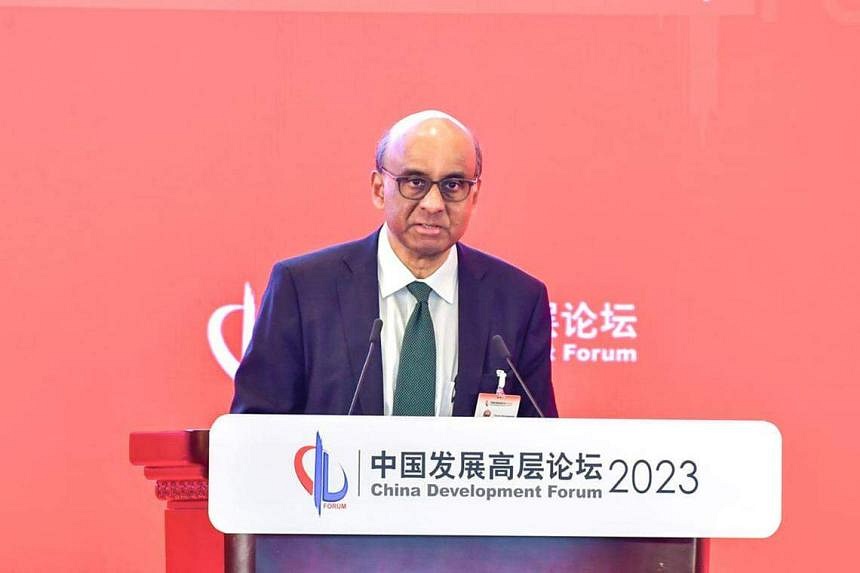风萧萧_Frank
以文会友尚达曼:美中竞争与合作将对世界产生“重大影响”
伊丽莎白·劳 中国通讯员 2023 年 3 月 27 日
新加坡高级部长尚达曼表示,美中紧张局势及其处理方式将对全球经济和所有国家产生重大影响。 照片:中国发展论坛
北京 — — 新加坡高级部长尚达曼周日表示,中国和美国需要找到一种将竞争与合作结合起来的方法,因为两国的竞争会对世界其他地区产生影响。
他在北京举行的中国发展高层论坛上对全球商界领袖和官员表示:“中美紧张局势及其处理方式显然将对全球经济和所有国家产生重大影响。” 。
他称这是一个竞争规模“前所未见”的时代,世界上最大的两个经济体也应该合作应对人类当前面临的挑战:气候变化、全球水资源短缺等。 危机、生物多样性丧失以及全球恐怖主义和核扩散等传统挑战。
近年来,华盛顿和北京之间的关系不断恶化,首先是特朗普政府期间激烈的贸易战,后来演变成一场技术军备竞赛,美国阻止了中国获得尖端技术。
与此同时,中国指责美国干涉其所谓的国内政治,包括北京视为自己的自治岛屿台湾。
尚达曼表示:“美国和中国如何能够将竞争(包括完全合法的经济竞争)与合作需求结合起来,需要相当大的战略雄心和技巧。
“但这对美国很重要; 这对中国很重要; 非常重要的是,这对世界很重要。”
他说,国际社会还需要从简单地应对流行病和金融危机等冲击和破坏转向通过投资公共产品(包括研发和医疗基础设施)来预防和准备此类事件。
“我们知道如何做到这一点,但我们在全球范围内投入的资源很少。 值得注意的是,在经历了人们记忆中最严重的大流行之后,我们正在恢复正常——我们正在留出极少量的资源来为下一次大流行做准备。” 对全球经济造成沉重打击。
“我们正在回归经济不负责任和政治短视,这可能导致未来发生灾难。”
尚达曼的演讲还包含他最近倡导的主题,例如终身学习,以及建立全球乐观和开放的态度。
他呼吁各国保持全球经济开放,尽管许多国家都在努力增强个人能力,他表示,后期的保护主义政策有可能导致全球经济支离破碎,甚至崩溃。
“每个人都会因此而变得更糟。 创新将受到影响; 生产率增长将受到影响; 每个集团都会遭受损失,”他说。
尚达曼在一场有关宏观经济政策和经济复苏的会议上发表上述讲话。 其他发言者包括国际货币基金组织总裁克里斯塔利娜·格奥尔基耶娃(Kristalina Georgieva); 中国最高经济规划师、国家发展和改革委员会主任郑善杰先生; 以及中国财政部长刘昆。
中国发展高层论坛被誉为“中国版的达沃斯世界经济论坛”,出席者包括苹果公司蒂姆·库克、辉瑞公司阿尔伯特·布尔拉和三星公司李在镕等跨国公司的负责人。
有关此主题的更多信息
苹果公司首席执行官蒂姆·库克访问北京盛赞中国的创新和悠久的合作历史
前食品药品监管机构呼吁中国分散医疗资源,提高透明度
外交部表示,周六,一批美国“友好组织和个人”还会见了中国外交部长秦刚。 外交部声明中附有的一张照片显示,出席会议的包括布尔拉、美中贸易全国委员会主席克雷格·艾伦和高通首席执行官克里斯蒂亚诺·阿蒙。
在中美双边关系紧张的情况下,美国高管一直对被认为与中国人关系密切持谨慎态度,担心会在国内产生影响。
秦先生在会议上表示,中国在Covid-19后的经济和社会重新开放以及经济复苏对美国商界来说是三重好处。 “但遗憾的是,今年春天中美关系依然冷淡,”他说。
他指出,中方对双边关系的立场没有改变,“中方一贯主张中美两国相互尊重、和平共处、合作共赢。”
US-China competition, cooperation will have 'great bearing' on world: Tharman
 Elizabeth Law China Correspondent MAR 27, 2023
Elizabeth Law China Correspondent MAR 27, 2023
Singapore's Senior Minister Tharman Shanmugaratnam said the US-China tension and the way it is managed will have great bearing on the global economy and on all nations. PHOTO: CHINA DEVELOPMENT FORUM
BEIJING – China and the United States need to find a way to combine competition with cooperation because their rivalry has repercussions throughout the rest of the world, said Singapore’s Senior Minister Tharman Shanmugaratnam on Sunday.
“(The) US-China tension, and the way it is managed, will clearly have great bearing on the global economy, great bearing on all nations,” he told an audience of global business leaders and officials at the China Development Forum in Beijing.
Calling this an era where there is competition on a scale that has “never been seen before”, he said this should also be a time when the world’s two largest economies should cooperate to address the current challenges facing humanity: climate change, a global water crisis, the loss of biodiversity, as well as traditional challenges such as global terrorism and nuclear proliferation.
Relations between Washington and Beijing have worsened in recent years, beginning with a bruising trade war during the Trump administration that has since evolved into a technological arms race, with the US choking off Chinese access to cutting-edge technology.
China, meanwhile, accuses the US of interfering with what it says are its domestic politics, including the self-ruling island of Taiwan that Beijing sees as its own.
Mr Tharman said: “How the US and China are able to combine competition – including perfectly legitimate, economic competition – with the need for cooperation is going to require considerable strategic ambition and skill.
“But it will matter to the US; it will matter to China; and very importantly, it will matter to the world.”
The international community also needs to shift from simply reacting to shocks and disruptions, such as pandemics and financial crises, to pre-empting and preparing for such events by investing in public goods, he said, which include research and development and healthcare infrastructure.
“We know how to do it, but we’re putting very little resources into it globally. It is remarkable how after the worst pandemic in living memory, we’re going back to normal – a very small amount of resources is being set aside to prepare for the next pandemic,” he said, referring to the Covid-19 pandemic that dealt a body blow to the global economy.
“We are reverting to economic irresponsibility and the political myopia that risks future catastrophe.”
Mr Tharman’s speech also contained themes he has recently championed, such as lifelong learning, as well as building global optimism and openness.
He called on countries to keep the global economy open, even as many make shifts to build up individual capacity, saying that the protectionist policies of late risk fragmenting, even breaking up, the global economy.
“Everyone will be worse off for that. Innovation will suffer; productivity growth will suffer; each of the blocs will suffer,” he said.
Mr Tharman was speaking during a session on macroeconomic policies and economic recovery. Other speakers included International Monetary Fund managing director Kristalina Georgieva; Mr Zheng Shanjie, head of China’s top economic planner, the National Development and Reform Commission; and China’s Finance Minister Liu Kun.
Touted as China’s answer to the Davos World Economic Forum, the China Development Forum welcomed attendees including the heads of multinational companies such as Apple’s Tim Cook, Pfizer’s Albert Bourla and Samsung’s Lee Jae-yong.
On Saturday, a group of American “friendly organisations and individuals” also met Chinese Foreign Minister Qin Gang, said the Ministry of Foreign Affairs. Attendees at the meeting included Mr Bourla, US-China Business Council president Craig Allen and Qualcomm chief executive Cristiano Amon, a photo accompanying a Foreign Ministry statement showed.
Amid frosty bilateral tensions between the US and China, American executives have been circumspect about being seen as hobnobbing with the Chinese, fearing a fallout back home.
During the meeting, Mr Qin said China‘s post-Covid-19 reopening, both economically and socially, and economic recovery are a triple benefit for the American business community. “Regrettably, however, China-US relations are still chilly this spring,” he said.
Noting that China’s stance on bilateral relations has not changed, he added: “China has always advocated for mutual respect, peaceful coexistence and win-win cooperation between China and the US.”




